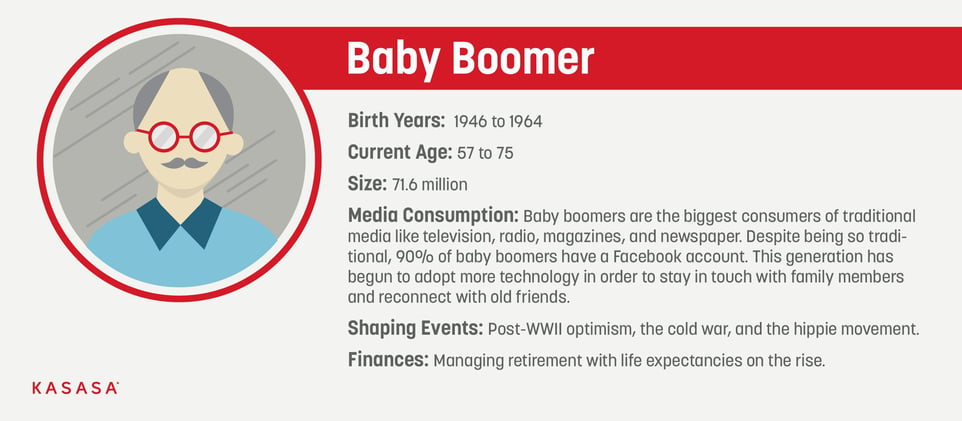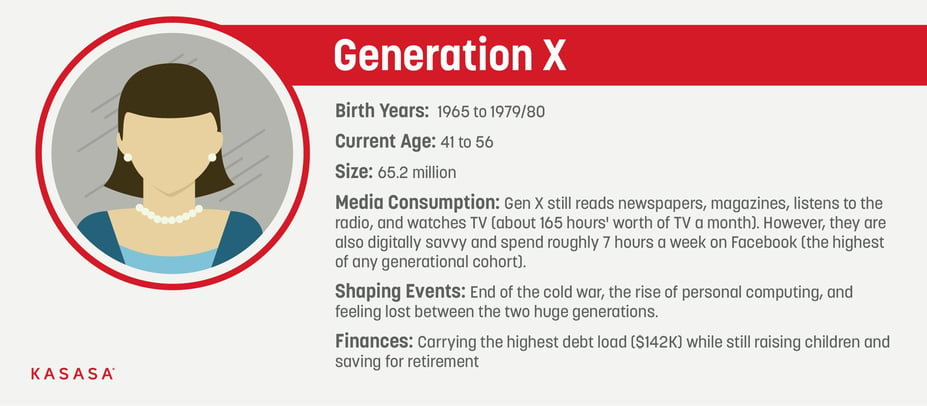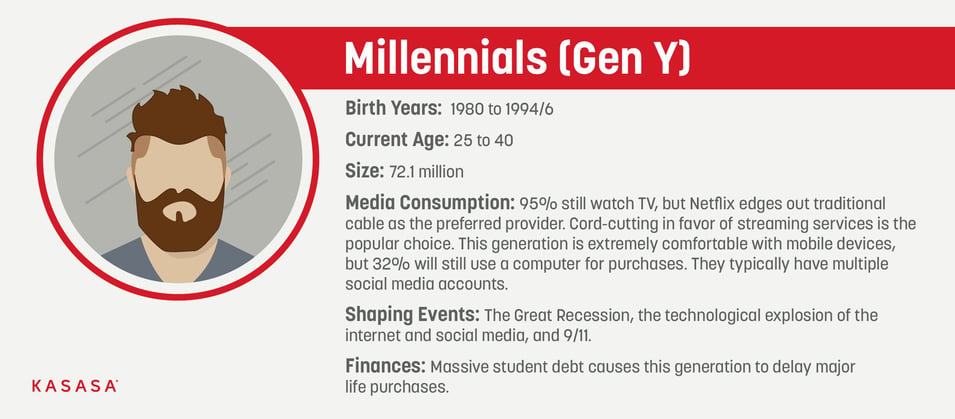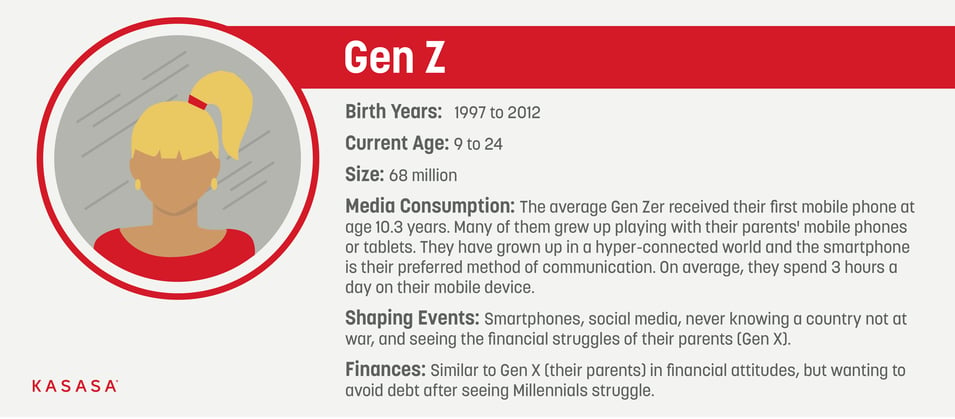What Did the Baby Boomers Ever Do for Us
What separates Generation Y from Ten? And hey Gen Z and Gen A, welcome to the political party! What'due south the cutoff? How sometime is each generation? Are they really that different?
Information technology's piece of cake to encounter why there is so much defoliation about generational cohorts.
If you've e'er felt muddled past this "alphabet soup" of names — you're not lonely. The real frustration hits when you realize that Millennial consumers stand for the highest-spending generation in 2020 — with a projected $1.4 trillion tab.
And though their electric current wealth has been dragged down past non one just two "once-in-a-lifetime" economic crises during their nigh impactful career years, Millennials stand to inherit over $68 trillion from Babe Boomer and early Gen X parents by the year 2030, setting them upwardly to potentially be the nigh wealthy generation in U.S. history.
Generation Z isn't far behind, projected to hit $33 trillion in income by 2030 — that'due south more than a quarter of all global income — and pass Millennials in spending power the twelvemonth later. 3
And coming up concluding but not least is Generation Alpha, the name given by social analyst Mark McCrindle to the youngest children on the planet. By the year 2025 at that place will be near 2 billion members of Generation Alpha beyond the globe.
No thing how yous slice the information, the younger generations take never been more disquisitional to your financial institution'due south future.
Unless you sympathise who they are and what they want, yous won't capture a dollar of their money.
People grow older. Birthdays stay the same.
A common source of confusion when labeling generations is their age. Generational cohorts are defined (loosely) by nativity yr, not current age. The reason is uncomplicated — generations get older in groups. If you recollect of Millennials every bit college kids (18 - 22), then non simply are you out of engagement — you're thinking of a stage in life, not a generation. Millennials are now well out of college, and that life stage is dominated past Gen Z.
Another example, a member of Generation X who turned 18 in 1998 would now be over 40. In that fourth dimension, he or she cares about vastly different issues and is receptive to a new fix of marketing messages. Regardless of your age, yous will always belong to the generation you lot were born into.
The breakdown by age looks like this:
-
Baby Boomers: Baby boomers were born between 1946 and 1964. They're currently between 57-75 years old (71.6 one thousand thousand in the U.South.)
-
Gen X: Gen X was born betwixt 1965 and 1979/lxxx and is currently between 41-56 years old (65.ii million people in the U.Southward.)
-
Gen Y: Gen Y, or Millennials, were built-in between 1981 and 1994/vi. They are currently between 25 and 40 years old (72.1 million in the U.S.)
-
Gen Y.one = 25-29 years one-time (effectually 31 million people in the U.Southward.)
-
Gen Y.ii = 29-39 (around 42 million people in the U.S.)
-
-
Gen Z: Gen Z is the newest generation, born between 1997 and 2012. They are currently between nine and 24 years old (nearly 68 million in the U.S.)
-
Gen A: Generation Blastoff starts with children born in 201 2 and will c ontinue at least through 2025, maybe later on (approximately 48 1000000 people in the U.Due south.)
The term "Millennial" has become the popular way to reference both segments of Gen Y (more on Y.i and Y.ii below).
Sometimes labeled with the moniker "Zillennials", those wedged at the tail end of Millennials and the start of Gen Z are sometimes labeled with this moniker — a group made up of people built-in between 1994 and the year 2000.
Originally, the name Generation Z was a placeholder for the youngest people on the planet — although Generation A has now taken over that distinction. All the same, in the same way that Gen Y morphed into Millennials, there is certainly a possibility that both Gen Z and Gen A may prefer new names as they leave boyhood and mature into their adult identities. While the label Gen A makes word easier, it may non exist the last discussion on this group of humans.
Why are generations named after letters?
Information technology started with Generation X, people born between 1965-1980. The preceding generation was the Infant Boomers, born 1946-1964. Mail-World State of war 2, Americans enjoyed newfound prosperity, which resulted in a "baby nail." The children built-in as a result were dubbed the Baby Boomers.
But the generation that followed the Boomers didn't have a blatant cultural identifier. In fact, that's the anecdotal origin of the term Gen X — illustrating the undetermined characteristics they would come up to be known by. Depending on whom y'all enquire, it was either sociologists, a novelist, or Billy Idol who cemented this phrase in our vocabulary.
From there on it was all down-alphabet. The generation following Gen Ten naturally became Gen Y, built-in 1981-1996 (give or take a few years on either finish). The term "Millennial" is widely credited to Neil Howe, forth with William Strauss. The pair coined the term in 1989 when the impending turn of the millennium began to feature heavily in the cultural consciousness.
Generation Z refers to babies born from the tardily 90s through today. A flurry of potential labels has also appeared, including Gen Tech, postal service-Millennials, iGeneration, Gen Y-Fi, and Zoomers.
While some say Generation Blastoff is named for the offset letter of the Greek alphabet and denotes the offset of a series of items or categories, Generation Alpha may also just be an easy mode to round the corner into a new alphabet.
Splitting up Gen Y
Javelin Research noticed that not all Millennials are currently in the same stage of life. While all Millennials were built-in around the turn of the century, some of them are still in early adulthood, wrestling with new careers and settling down, while the older Millennials have a home and are building a family. You tin can imagine how having a child might modify your interests and priorities, so for marketing purposes, it's useful to split this generation into Gen Y.1 and Gen Y.2.
Not just are the 2 groups culturally different, just they're in vastly different phases of their financial life. The younger grouping is only now flexing their ownership ability. The latter group has a more extensive history and may be refinancing their mortgage and raising children. The contrast in priorities and needs is stark.
The same logic can be applied to whatsoever generation that is in this stage of life or younger. Equally we get older, we tend to homogenize and face similar life bug. The younger we are, the more dramatic each stage of life is. Consider the difference between someone in unproblematic school and loftier schoolhouse. While they might be the same generation, they accept very different views and needs.
Marketing to young generations equally a unmarried accomplice volition not exist nearly as constructive as segmenting your strategy and messaging.
Why are generation cohort names important?
Each generation label serves as a shorthand to reference nearly twenty years of attitude, motivations, and historical events. Few individuals cocky-place as Gen Ten, Millennial, or any other name.
They're useful terms for marketers and tend to trickle downward into common usage. Again, it's important to emphasize that referring to a accomplice only by the historic period range gets complicated quickly. Ten years from now, the priorities of Millennials will have changed — and marketing tactics must adjust instep. There are also other categories of cohorts you tin can use to improve understand consumers going across historic period or generation.
Remember, these arbitrary generational cutoff points are just that. They aren't an exact science and are continually evolving.
Whatever terminology or grouping you utilize, the goal is to reach people with marketing messages relevant to their phase of life. In short, no matter how many letters get added to the alphabet soup, the almost important thing you can practise is seek to understand the soup du jour for the type of consumer y'all want to attract.
What makes each generation different?
Before we dive into each generation, think that the exact years built-in are in dispute, considering there are no comparably definitive thresholds past which the afterward generations (afterward Boomers) are defined. But this should requite yous a general range to help identify what generation you belong in.
The other fact to retrieve is that new applied science is typically outset adopted by the youngest generation and so is gradually adopted by the older generations. Every bit an example, 96% of Americans have a smartphone, but Gen Z (the youngest generation) is the highest user.
The Babe Boomer Generation

-
Boomer Birth Years: 1946 to 1964
-
Current Age: 57 to 75
-
Generation Size: 71.6 million
-
Media Consumption:Infant boomers are the biggest consumers of traditional media like idiot box, radio, magazines, and newspaper. Despite being so traditional, 90% of baby boomers have a Facebook business relationship. This generation has begun to adopt more technology in lodge to stay in impact with family members and reconnect with quondam friends.
-
Banking Habits: Boomers prefer to go into a branch to perform transactions. This generational cohort still prefers to use cash, particularly for purchases nether $5.
-
Shaping Events:Postal service-WWII optimism, the common cold war, and the hippie movement.
-
What's next on their financial horizon: This generation is experiencing the highest growth in student loan debt. While this might seem counterintuitive, it can exist explained past the fact that this generation has the most wealth and is looking to assist their children with their student debt. They have a belief that you should have intendance of your children enough to set up them on the right course and don't plan on leaving whatsoever inheritance. With more than Americans outliving their retirement fund, declining pensions, and social security in jeopardy, ensuring you can successfully fund retirement is a major concern for Boomers.
Generation 10

-
Gen X Birth Years: 1965 to 1979/lxxx
-
Current Age: 41 to 56
-
Other Nicknames: "Latchkey" generation, MTV generation
-
Generation Size:65.two 1000000
-
Media Consumption:Gen Ten still reads newspapers, magazines, listens to the radio, and watches Telly (about 165 hours' worth of Tv a month). Notwithstanding, they are too digitally savvy and spend roughly 7 hours a week on Facebook (the highest of any generational accomplice).
-
Banking Habits:Since they are digitally savvy, Gen X will practice some inquiry and financial management online, but notwithstanding prefer to do transactions in person. They believe cyberbanking is a person-to-person business and demonstrate brand loyalty.
-
Shaping Events: Stop of the cold state of war, the rise of personal computing, and feeling lost betwixt the two huge generations.
-
What's next on Gen 10'southward financial horizon: Gen X is trying to raise a family unit, pay off student debt, and have intendance of aging parents. These demands put a high strain on their resources. The average Gen Xer carries $142,000 in debt, though most of this is in their mortgage. They are looking to reduce their debt while edifice a stable saving programme for the future.
Millennials (Gen Y)

-
Millennial Birth Years: 1981 to 1994/six
-
Current Age: 25 to 40
-
Other Nicknames:Gen Y, Gen Me, Gen Nosotros, Echo Boomers
-
Generation Size: 72.ane million
-
Media Consumption:95% still watch Tv, merely Netflix edges out traditional cablevision as the preferred provider. Cord-cut in favor of streaming services is the popular choice. This generation is extremely comfortable with mobile devices, simply 32% will still use a computer for purchases. They typically have multiple social media accounts.
-
Banking Habits:Millennials have less make loyalty than previous generations. They prefer to shop products and features starting time, and have little patience for inefficient or poor service. Because of this, Millennials place their trust in brands with superior product history such every bit Apple tree and Google. They seek digital tools to help manage their debt and see their banks as transactional as opposed to relational.
-
Shaping Events: The Great Recession, the technological explosion of the internet and social media, and nine/11
-
What's next on their financial horizon:Millennials are powering the workforce, only with huge amounts of student debt. This is delaying major purchases like weddings and homes. Because of this financial instability, Millennials choose admission over ownership, which can be seen through their preference for on-demand services. They want partners that will aid guide them to their large purchases.
Gen Z

-
Gen Z Birth Years: 1997 to 2012
-
Currently Aged: 9 to 24
-
Other Nicknames: iGeneration, Post-millennials, Homeland Generation
-
Generation Size:68 million
-
Media Consumption:The average Gen Zer received their outset mobile phone at historic period 10.3 years. Many of them grew up playing with their parents' mobile phones or tablets. They accept grown upward in a hyper-connected world and the smartphone is their preferred method of communication. On average, they spend three hours a day on their mobile device.
-
Banking Habits:This generation has seen the struggle of Millennials and has adopted a more fiscally conservative approach. They want to avert debt and appreciate accounts or services that help in that endeavor. Debit cards summit their priority listing, followed past mobile banking.
-
Shaping Events:Smartphones, social media, never knowing a country non at war, and seeing the fiscal struggles of their parents (Gen X).
-
What'south next on Gen Z'due south financial horizon:Learning about personal finance. They have a potent ambition for fiscal education and are opening savings accounts at younger ages than prior generations.
If you desire to know more about Gen Z, check out this deep swoop into their media consumption and banking habits.
Generation Alpha

-
Generation Alpha Nativity Years: 2012 to 20256
-
Currently Aged: 0 to ix
-
Other Nicknames: None that have stuck. Oftentimes the nickname centers on a defining issue or characteristic.
-
Generation Size: 48 million and growing
-
Media Consumption: Alphas are being raised in homes with smart speakers and devices everywhere; engineering science is congenital into everyday items. Many of them attended school nearly thanks to the global pandemic and are gravitating toward online learning with programs such as Khan Academy, Prodigy, and IXL. Many have fifty-fifty had a digital presence since before they were born, with their Millennial parents creating social media handles for their infants.
-
Banking Habits: Although some of the oldest Alphas may have accounts such as Greenlight, they do non have defining banking habits. They're digital natives that will expect fully integrated, personalized consumer experiences. Based on current information, it appears that Alphas will be one of the most highly educated and wealthy generations. It is not clear if their banking habits will be influenced by their parents (i.e. "my parents banking company here, so practise I") or past other factors.
-
Shaping Events: Global pandemic, social justice movement, Trump-era politics, and Brexit.
-
What'southward adjacent on Generation Alpha'due south fiscal horizon: Equally digital natives who view the world through a drove of screens, Blastoff'south will be even more disconnected from the idea of greenbacks. They will likely first meet money equally a number on a screen and spend it through apps and other forms of ecommerce.
Do generations use technology differently?
Younger generations take often led older Americans in their adoption and use of technology, and this largely holds truthful today.
Although Baby Boomers may trail Gen X and Millennials on native technology usage, the rate at which Boomers expand their use of technology is accelerated.
In fact, Boomers are far more probable to ain a smartphone than they were in 2011 (68% in 2019 vs. 25% and then).
Are generations the all-time way to categorize consumer beliefs?
Knowing generational trends is important, equally they can unveil similar attitudes and behaviors amongst consumers who experienced world events at the same life stage as their cohorts. And it doesn't hurt to understand these historic period groups since marketing tools and audience segmentations generally include historic period as a factor.
But the generations don't tell the whole story and their behaviors tin can exist hard to lock down. After all, every generation grows up. So. can y'all rely on age ranges alone? Here'south what nosotros call back.
Practise generations bank differently?
Admittedly, and for several reasons.
-
Each generation has been in the workforce for different lengths of time and accumulated varying degrees of wealth.
-
Baby Boomers take an average net worth of $1,066,000 and a median net worth of $224,000.
-
Gen Xers boilerplate net worth is around $288,700, but the median is $59,800.
-
Millennials have an average cyberspace worth around $76,200, but their median net worth is merely $xi,100.
-
Gen Z's average net worth is difficult to report on since so much of the generation has no net worth or career as of even so.
-
Each generation is preparing and saving for unlike life stages; be that retirement, children's college tuition, or ownership a first motorcar.
-
Each generation grew upwardly in evolving technological worlds and has unique preferences in regard to managing financial relationships.
-
Each generation grew up in dissimilar financial climates, which has informed their financial attitudes and opinions of institutions. Even so, in the by year, the COVID-nineteen pandemic has go the great blaster, as all generations accept had to accommodate to a new way of banking and living.
How are these banking differences appearing in the marketplace?
Ease of use vs. personal service.
If y'all remember bots are taking over the world, you might be right. But for Millennial and Gen Z consumers, this isn't necessarily a bad thing. In fact, according to a recent Adobe Analytics report, 44% of Gen Z and 31% of Millennials have used a banking chatbot to answer their questions. And before you lot think that must be a terrible user experience, over half of both groups who actually used a chatbot said the experience was better than talking to a real person.
Notwithstanding, for more complicated banking tasks, even the younger generations prefer the added assistance of a human representative.
Security still comes get-go, ever. But each generation has their own priorities.
When choosing a new place to bank, "security" was the height-rated concern across Gen Z, Millennials, Gen X, and Boomers. "Reputation" (also known as your brand) finished second for both Gen Z and Millennial consumers.
However, for Gen Z and Boomer consumers, branch locations was the second about popular issue, with "reputation" close behind. Younger consumers still care about branch locations but weigh it around the same level as an institution's digital and app services.
For Generation Ten, digital and app services were edged out by in-person support. For Babe Boomers, banking local was more important.4 However, earlier you write off the importance of your online and mobile banking for these consumers…
Technology isn't just for younger generations anymore.
The trend has long been for each new generation to adopt digital and mobile banking services more readily. But the COVID-19 pandemic has turned on a new wave of late-adopters who now bank digitally, too.
According to a contempo Zelle survey, now 82% of seniors age 55+ are banking online more oft — with 61% and 55% turning to social media and mobile banking more frequently too.v
That lines up closely with the start of the Baby Boomer demographic (currently ages 57 to 75). And while simply fourth dimension will tell how lasting this shift to digital tools and services will be, the more positive your digital experience, the more likely y'all are to extend your digital reach with this generation.
Today, older generations are behaving more like younger generations. And if you lot desire to succeed in tomorrow's market, you already need to meet these younger generations where they are. Now is the time to extend your brand of groovy service beyond the branch.
1 SOURCE: https://www.5wpr.com/new/research/5wpr-2020-consumer-culture-report/
ii SOURCE:https://blog.coldwellbankerluxury.com/wp-content/uploads/2019/10/CBGL-Millennial-Report_SEP19_FINAL-4a.1-1-ane.pdf
3 SOURCE:https://markets.businessinsider.com/news/stocks/gen-z-economic-impact-outlook-spending-permanently-change-investing-bofa-2020-11-1029822486
4SOURCE:https://weblog.adobe.com/en/publish/2019/eleven/20/adobe-analytics-research-how-different-generations-bank.html#gs.pjzilf
five SOURCE:https://www.zellepay.com/sites/default/files/2020-06/Senior_Polling_FINAL.pdf
6 SOURCE: https://2qean3b1jjd1s87812ool5ji-wpengine.netdna-ssl.com/wp-content/uploads/Gen-Blastoff-2020-digital-1.pdf
Source: https://www.kasasa.com/exchange/articles/generations/gen-x-gen-y-gen-z
0 Response to "What Did the Baby Boomers Ever Do for Us"
Post a Comment